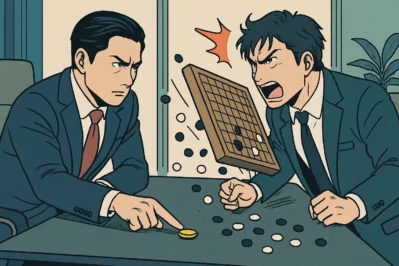Hello! This is [Daily Hangul], here to upgrade your Korean skills to the executive level!
Today, we’re diving into a fascinating topic that blends psychology, economics, and high-stakes negotiation: the Ultimatum Game (최후통첩 게임). This isn’t just an academic concept; it’s a powerful lens through which you can understand everything from business deals to social dynamics. Lately in Korea, you see this exact tension play out constantly in popular K-dramas centered on corporate inheritance battles and startup rivalries. We’ll learn the essential Korean vocabulary to analyze these situations like a pro and even use these strategies yourself.
Core Expressions for Your Strategic Toolkit
Here are three key phrases you need to master the art of the ultimatum in Korean.
1. 최후통첩 (Choehu-tongcheop)
- Pronunciation: [chwe-hoo-tong-cheop]
- English Meaning: Ultimatum; a final proposition, condition, or demand.
- Detailed Explanation: This is a formal, high-stakes word composed of Hanja: 最後 (choehu) meaning “final” or “last,” and 通牒 (tongcheop) meaning “diplomatic notice” or “dispatch.” While it has roots in diplomacy and warfare, in modern Korean, it’s used for any serious “take it or leave it” offer in business or even personal relationships. It implies that no further negotiation is possible.
2. 판을 엎다 (Pan-eul eop-da)
- Pronunciation: [pan-eul-eop-tta]
- English Meaning: To flip the board/table; to scrap the whole deal.
- Detailed Explanation: Literally meaning “to flip the game board” (like a chessboard or Go board), this powerful idiom means to completely nullify a situation, negotiation, or plan out of frustration or disagreement. In the context of the Ultimatum Game, this is what the responder does when they reject an unfair offer. They aren’t just saying “no”; they are destroying the entire game, ensuring no one gets anything. It’s an act of defiance.
3. 이도 저도 아니다 (Ido jeodo anida)
- Pronunciation: [i-do-jeo-do-a-ni-da]
- English Meaning: To be neither this nor that; to end up with nothing.
- Detailed Explanation: This expression perfectly describes the outcome of a failed negotiation or a rejected ultimatum. It signifies a state of limbo or a lose-lose situation where the intended goal is not achieved, and an alternative solution isn’t found either. If the proposer offers too little and the responder “flips the board,” the result is 이도 저도 아닌 상황 (a situation that is neither here nor there).
Example Dialogue: A K-Drama Negotiation
A and B are discussing the latest episode of a popular drama about a corporate takeover.
A: 그 드라마 봤어? 회장이 주인공한테 지분 10%만 주면서 제안하는 장면 말이야. 완전 최후통첩이었어.
(Did you see that drama? I’m talking about the scene where the chairman offers the main character only 10% of the company shares. It was a total ultimatum.)
B: 응, 봤지. 주인공이 그걸 받아들일 리가 없잖아. 결국엔 그냥 판을 엎어 버리더라.
(Yeah, I saw it. There’s no way the main character would accept that. In the end, they just flipped the whole board.)
A: 맞아. 그래서 결국 둘 다 경영권을 놓치고 회사는 엉망이 됐지. 완전히 이도 저도 아닌 꼴이 된 거야.
(Right. So in the end, they both lost control of management and the company is a mess. It became a situation of ending up with nothing.)
Cultural Tip & Trend Deep Dive: Beyond Pure Rationality
In classic game theory, the “rational” choice for the responder in the Ultimatum Game is to accept any offer greater than zero. After all, something is better than nothing. However, this often fails in practice, especially in a Korean context. Why?
The answer lies in the cultural concepts of 체면 (chaemyeon – face/social standing) and 정 (jeong – a deep, emotional connection).
- The Power of 체면: A blatantly unfair offer (e.g., a 9:1 split) isn’t just a bad deal; it’s a personal insult. It implies the proposer sees the responder as insignificant. To maintain one’s 체면, rejecting the offer and choosing to 판을 엎다 is often seen as the more honorable, albeit less profitable, choice. You’ll see this constantly in K-dramas: a character will reject a lucrative but insulting offer to protect their pride.
-
When Business is Personal: Korean business culture often emphasizes building relationships (정) before striking a deal. An ultimatum, especially a harsh one, can sever that 정, making future cooperation impossible. The proposer isn’t just risking the current deal; they’re risking the entire relationship. Therefore, a “fair” offer is often a strategic investment in the long-term relationship.
Let’s Wrap Up & Practice!
Today, we explored the complex world of negotiation through the lens of the Ultimatum Game. You learned three crucial expressions:
- 최후통첩 (Ultimatum): The final, non-negotiable offer.
- 판을 엎다 (To flip the board): To reject a deal entirely and defiantly.
- 이도 저도 아니다 (To be neither this nor that): The lose-lose outcome of a failed negotiation.
Now, it’s your turn to be the strategist!
- Fill in the blank: If a business partner makes a completely unreasonable demand, you might say, “그런 식이라면, 그냥 이 협상은 ________.” (If you’re going to be like that, let’s just ______ this negotiation.)
- Sentence Challenge: Think of a time you were given a “take it or leave it” offer (for a job, a price, a plan with a friend). Describe the situation in one sentence using 최후통첩.
Share your answers and your own strategic sentences in the comments below! Let’s see what you’ve got






